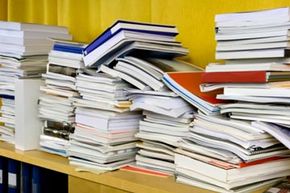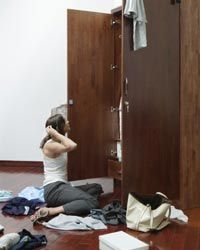"Simplify, simplify," urged nineteenth-century philosopher Henry David Thoreau. "I say, let your affairs be as two or three, not a hundred or a thousand" [source: Thoreau Institute at Walden Woods]. If you regularly plow through piles of clutter in your home, looking for the one thing you need and can't find, you may tell yourself the same thing.
You're not alone. In a 2008 survey, two-thirds of all respondents said their homes were at least somewhat disorganized, and 70 percent said that being better organized would improve their lives. Almost everyone agreed they could save time, up to one hour a day, by improved home organization [source: National Association of Professional Organizers].
Advertisement
How does clutter grow to become a home's decorating theme? Some people have trouble making decisions about when to get rid of something, fearing they'll need it later (inevitably, it seems, just after they've thrown it out). Others surround themselves with backup goods and gadgets in case the first one fails -- or gets lost. Likewise, some people hang on to every token or souvenir with the slightest sentimental value.
Whatever the cause, this article will try to help you put Thoreau's advice into practice. It explains general methods of managing space effectively. It recommends tools and techniques for applying these ideas. You'll also read tips for home cleaning and for maintaining an orderly state of affairs.
Decluttering your house might seem daunting, but it's doable. Compare it to going on a diet. You're not likely to vanquish clutter in one house-cleaning marathon any more than you should plan to lose 20 pounds in time for a high school reunion next weekend. Instead, aim at replacing clutter-causing habits with home-organizing skills. Develop a plan for reorganizing and stick to it. Room-by-room works well for some people. Alternately, you might decide to focus on one particular problem at a time -- the clothing clog in your closets, say, and then the writing implements that overrun your office.
At the same time, know that a certain amount of clutter isn't "bad for you," just as the occasional triple-chocolate brownie won't blow your diet. Just don't indulge to the point that it harms your health or your quality of life.
In that spirit, start to reclaim your house from clutter. Begin by taking a look at some basic strategies.
Advertisement





